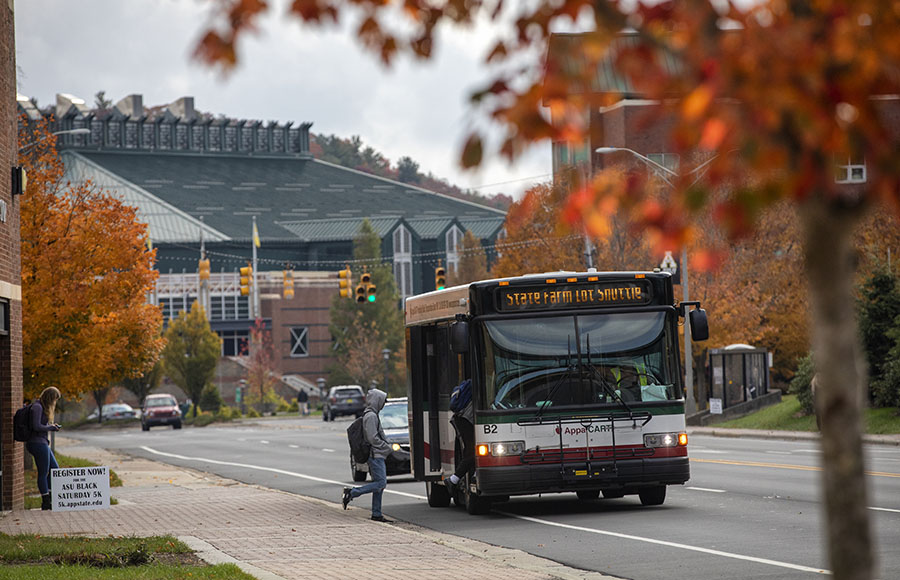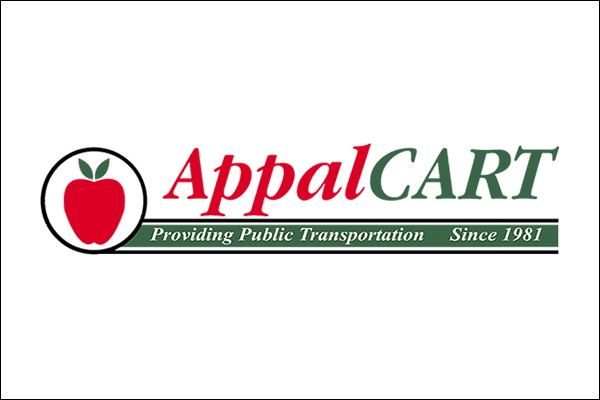BOONE, N.C. — More than $1 million in grant funds — the result of a collaboration between AppalCART and Appalachian State University — may soon make an electric bus the transit option of choice for the High Country.
Two North Carolina Department of Environmental Quality (NCDEQ) grant programs — the Diesel Bus and Vehicle Program and the Zero Emission Vehicle (ZEV) Infrastructure Program — will provide AppalCART with $1,001,500 toward the purchase of an electric bus and charging station.
With this funding, AppalCART has set its course toward adding ZEVs to its already-efficient fleet of buses and vans servicing Watauga County residents and Appalachian students, said AppalCART Director Craig Hughes.
“This award is an excellent example of what can happen when our community pools its resources and works toward a goal that benefits everyone in the High Country,” Hughes said. “The entire community — Watauga County, town of Boone and App State — have been supportive of electrification of the AppalCART fleet for a while, and this is a very strong and decisive first step in the process.”
“This move toward electric transit vehicles is just one piece of AppalCART’s role in helping the town of Boone and Watauga County meet their goal of 100% clean energy by 2050,” he continued. “It’s also a response to the App State community’s strong desire for AppalCART to transition to a more environmentally friendly fleet.”
Hughes said the award was the result of work from key leaders and organizations in the High Country, including George Baldwin, Appalachian’s executive director for corporate and foundation relations, and Dr. Lee F. Ball Jr., Appalachian’s chief sustainability officer. The Boone Area Chamber of Commerce also lent valuable support.
“This award demonstrates what happens when community stakeholders work together to achieve mutual goals,” Ball said. “In this instance, we focused on collaboration. Working together, we are taking concrete steps to reduce our collective carbon footprint. We appreciate the relationships with the Boone Area Chamber of Commerce and AppalCART that allow us to make lasting and meaningful change.”
Planning for the road ahead
The NCDEQ grant is a significant milestone in building a ZEV fleet. “As part of this endeavor, AppalCART will develop an economical and sustainable plan for deploying an electric fleet in the High Country,” Hughes said.
AppalCART is working with the North Carolina Department of Transportation to obtain funding through the Federal Transit Authority’s HOPE Program. The HOPE Program — Helping Obtain Prosperity for Everyone — would fund plan development and infrastructure necessary for deploying and maintaining electric transit vehicles.
Hughes said he hopes the planning period required to deploy electric vehicles will help other areas of the state as they consider battery electric buses and other ZEV transit.
“AppalCART recognizes that planning is key for a successful future deployment of battery electric buses,” Hughes said. “The planning will provide a key case study for other areas of the state with similar geography and operating characteristics that are interested in battery electric buses.”
AppalCART carries 13,000–14,000 passengers per day, Hughes said, “which significantly cuts down the need for cars on the road. AppalCART’s current fleet of efficient, diesel-fueled vehicles provides residents and students with lower impact transportation options. Adding ZEVs would accelerate the county’s trajectory toward clean energy.”
According to Hughes, “AppalCART helps reduce commuter traffic by as much as 6,000 vehicles per day, providing the High Country the easiest and most cost-effective way to protect our community’s air quality and natural resources. Thanks to this grant, not only will we be removing those auto emissions from the roads, we are also removing a diesel-powered bus. This reduction in emissions will be further enhanced as electrical utilities shift to cleaner energy production.”
The $1 million-plus grant is part of Phase 1 of the North Carolina VW Settlement Program — an agreement between the German automaker Volkswagen (VW) and the U.S. Department of Justice on behalf of the U.S. Environmental Protection Agency (EPA). Phase 1 of this program provides North Carolina with $30.68 million earmarked for fuel-efficient and zero emissions vehicles and infrastructure.
Learn more about the North Carolina VW Settlement
What do you think?
Share your feedback on this story.
About AppalCART
Established in 1980, Appalachian Campus Area Rapid Transit (AppalCART) provides free public bus and van transit for Watauga County residents and visitors, as well as members of the Appalachian State University Community. The transit authority operates 12 bus routes in the Boone area and 10 van routes throughout the county, providing access to jobs, education, health care and community services for 13,000–14,000 passengers per day. It is funded by local, state and federal governments, as well as human service agencies and Appalachian. Learn more at https://www.appalcart.com.
About Appalachian State University
As a premier public institution, Appalachian State University prepares students to lead purposeful lives. App State is one of 17 campuses in the University of North Carolina System, with a national reputation for innovative teaching and opening access to a high-quality, cost-effective education. The university enrolls more than 21,000 students, has a low student-to-faculty ratio and offers more than 150 undergraduate and 80 graduate majors at its Boone and Hickory campuses and through App State Online. Learn more at https://www.appstate.edu.




![How NCInnovation Is Rethinking Economic Development in North Carolina [faculty featured]](/_images/_posts/2026/02/rethinking-economic-development-600x400.jpg)








